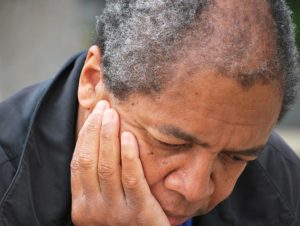FAQs About Depression in Elderly Adults
September 26, 2018
When an elderly person is experiencing major depression, it can interfere with so many aspects of their lives. Sadly, too many seniors suffer from depression because it often goes undiagnosed and therefore untreated. Remember that depression is a medical condition that can only be improved when treated by professionals. Family caregivers that have an aging adult relative that is dealing with depression should learn all they can about the condition, so they can support their loved one.

Here are some frequently asked questions about depression in elderly adults:
Q: Isn’t depression just about feeling sad?
A: While everyone feels blue from time to time, clinical depression is a medical condition that can really interfere with someone’s life. Seniors go through a lot of changes in their later years, such as dealing with health conditions, loss of spouse and siblings, financial issues, and worries about life and death. Depression doesn’t go away on its own but rather needs to be treated by professionals.
Q: What are the symptoms of depression in seniors?
A: While depression can manifest in different ways, there are some common symptoms. Among the most common are decreased energy, lack of interest, poor focus, aches and pains, feelings of worthlessness, persistent sad feelings, feelings of helplessness, feelings of guilt and thoughts of suicide. Depression is frequently undiagnosed and untreated in seniors because they fail to share how they feel or else family members think the symptoms are just a natural part of aging.
Q: Are there risk factors for depression in elderly adults?
A: Depression can occur at any age. With seniors, there are a few risk factors that family caregivers can watch for in their elderly relative. Key risk factors include having a chronic illness or disability, being isolated and lonely and have a family history of the mental illness. Depression is also more common in those who heavily use drugs or alcohol. If someone has recently gone through a stressful situation, such as the loss of a spouse, that could trigger a depressive episode.
Q: How is depression treated in seniors?
A: Depression is a very serious mental health disease that is often overlooked. It’s critical that family caregivers get their loved one to a doctor right away if they suspect depression. A combination of antidepressant medication and cognitive behavior therapy with a professional can also help.
Q: Can home care providers help elderly adults with depression?
A: Many family caregivers hire a senior care provider to assist their loved one with daily tasks and to provide companionship. This professional assistant can ensure there are healthy meals and snacks, as well as a clean, comfortable environment. The senior care provider can also drive the elderly person to social activities and ease their isolation and loneliness.
Q: Is depression curable in aging adults?
A: Depression is very treatable when a plan, managed by a professional, is in place. Family caregivers and senior care providers must help the senior stick to the treatment plan and offer full support. It’s important for family caregivers and senior care providers to listen to the elderly person’s concerns and keep them active and occupied. In time, their depression will lift thanks to effective treatment and strong support.